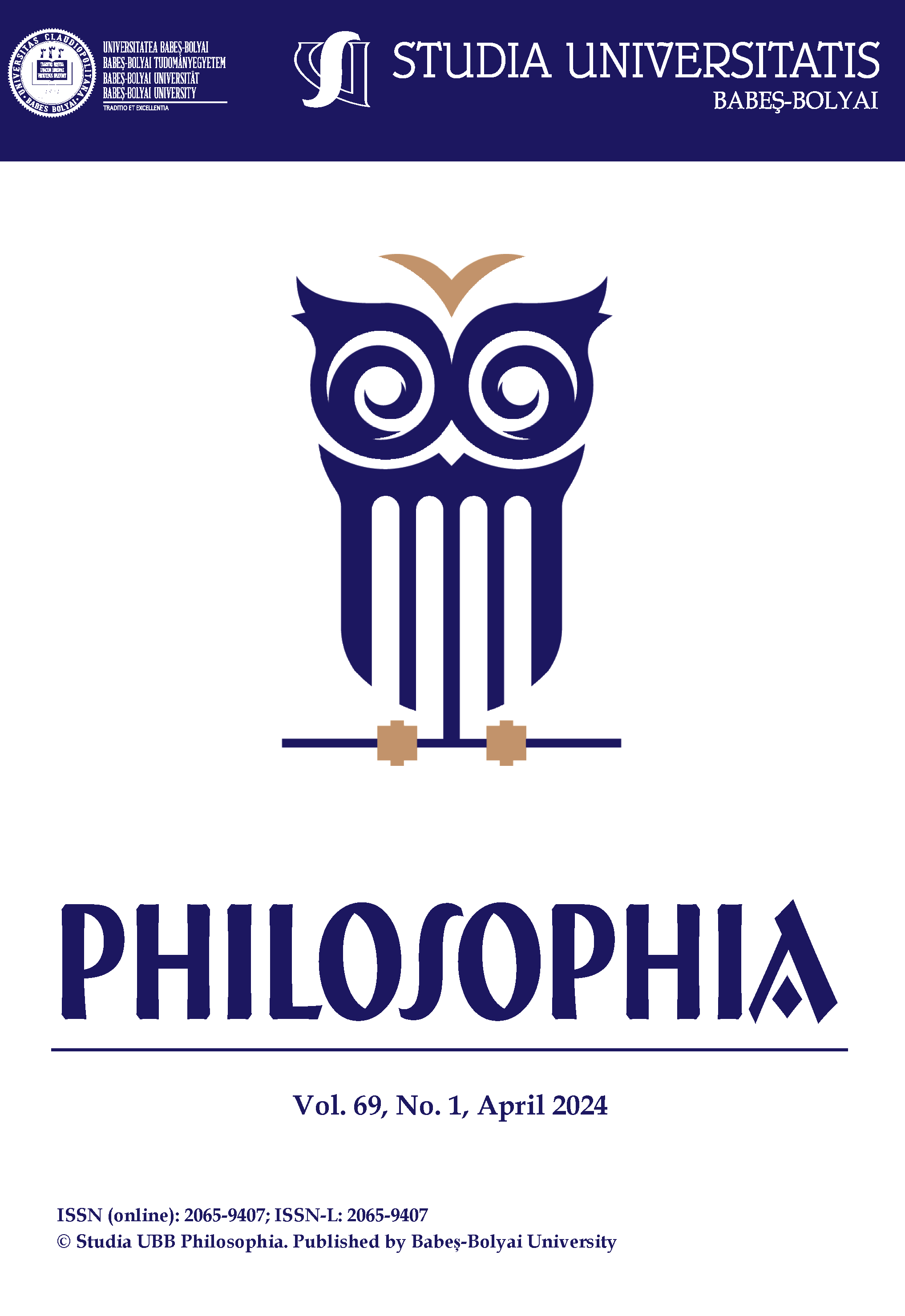Knowledge, Opinion, Belief: The Dialectical Challenging
DOI:
https://doi.org/10.24193/subbphil.2024.1.01Keywords:
epistemology, knowledge, opinion, belief, truth, cognisance, system, criteria, dialectic.Abstract
This paper is written in the continental tradition – facing the analytic one – and advocates the knowledge first thesis, reviewing the entailment thesis (where believing is knowing, because to know entails to believe). It starts from the ancient distinction between knowledge and opinion and develops criteria for distinguishing knowledge, opinion and belief. The demonstration necessarily arrives to the kinds of beliefs and thus, to the relationships between knowledge and these kinds. While the distinction of kinds of beliefs leads to the understanding of why the knowledge belief problem did appear in epistemology, the analysis with this distinction is not rigid and can be approached dialectically. This standpoint is aiming at contributing to the debate of knowledge belief problem and to warmer relations between the continental and the analytic philosophy.
References
Anastassopoulou-Kapogianni, Theoni. “The Evolutionary Conception of Knowledge: A Reference to Ancient and Modern Views”, in Greek Philosophy and Epistemology, Volume II, Edited by Konstantine Boudouris, Athens, International Center for Greek Philosophy and Culture & K.B., 2001, pp. 11-18.
Angioni, Lucas, “Aristotle’s Contrast between Episteme and Doxa in Its Context (Posterior Analytics, I, 33)”, Manuscrito, 42 (4), 2019, pp. 157-210.
Antognazza, Maria Rosa, “The distinction in kind between knowledge and belief”. Meeting of the Aristotelian Society held online on 18 May 2020, Proceedings of the Aristotelian Society, 2020, Vol. cxx, Part 3.
Bazac, Ana, “The Last Stage Explanation Within the Study of Society”, Noesis, XXXIV, 2009, pp. 81-91.
Bengson, John, Mark. A. Moffett & Jennifer C. Wright, “The Folk on Knowing How”, Philosophical Studies 142:3, 2009, pp. 387-401.
Boger, George, “Subordinating Truth – Is Acceptability Acceptable?”, Argumentation, 19, 2005, pp. 187-238.
Boudon, Raymond, L’art de se persuader des idées douteuses, fragiles ou fausses, Paris, Fayard, 1990.
Brownstein, Michael & Eliot Michaelson, “Doing Without Believing: Intellectualism, Knowledge-How, and Belief-Attribution”, Synthese, 193(9), 2016, pp. 2815-2836.
Buckwalter, Wesley, David Rose, and John Turri. “Belief through Thick and Thin.” Noûs 49 (4), 2015, pp. 748–75.
Cotnoir, A.J., Achile C. Varzi (Eds.), Mereology, Oxford University Press, 2021.
Patricia Curd, “Thinking, Supposing, and Physis in Parmenides”, Études platoniciennes, 12, 2015, http://journals.openedition.org/etudesplatoniciennes/741.
Engel, Pascal, Des sceptiques peu casaniers, 5 septembre 2023, https://www.en-attendant-nadeau.fr/2023/09/05/voyageurs-doute-van-damme/.
Gruber, Monika, Either you know or you’ve gotta believe, Jun 1, 2023,
https://www.qeios.com/read/IMUAZJ.
Hegel, G.W.F. “Wer denkt abstrakt ?” (1807), G. W. F. Hegel, Werke in zwanzig Bänden, Frankfurt am Main, Surkamp Verlag, 1970, 2 Band (Jenaer Schriften – 1801-1807), pp. 575-580.
Heraclitus, The Complete Fragments, 2, Translation and Commentary and the Greek Text, William Harris, 1994, http://wayback.archive-it.org/6670/20161201175133/,
http://community.middlebury.edu/~harris/Philosophy/Heraclitus.html.
Jenkins, Jonathan, Matthias Steup, The Analysis of Knowledge, 2017, The Stanford Encyclopedia of Philosophy (Fall 2019 edition),
https://plato.stanford.edu/archives/fall2019/entries/knowledge-analysis/.
Jersakova, Radka, Chris Moulin, Akira Robert O’Connor, “Investigating the role of assessment method on reports of déjà vu and tip-of-the-tongue states during standard recognition tests”, Plos One, Volume 11, Issue 4, 2016, e0154334.
Krämer, Sybille. “‘The Mind’s Eye’: Visualizing the Non-visual and the ‘Epistemology of the Line’”, in Image and Imaging in Philosophy, Science and the Arts, volume 2, edited by Richard Heinrich, Elisabeth Nemeth, Wolfram Pichler and David Wagner. Frankfurt · Lancaster · Paris · New Brunswick, Ontos Verlag, 2011, pp. 275–293.
Kuhn, Deanna, Richard Cheney, Michael Weinstock, “The development of epistemological Understanding”, Cognitive Development, 15, 2000, pp. 309- 328.
Larose, Daniel. “Sur la présence implicite de la notion d’opinion droite dans les dialogues de jeunesse de Platon”, Études platoniciennes, 12, 2015,
https://doi.org/10.4000/etudesplatoniciennes.687.
Littlejohn, Clayton, “How and Why Knowledge is First”, in J. Adam Carter, Emma C. Gordon, Benjamin Jarvis (Editors), Knowledge First: Approaches in Epistemology and Mind, Oxford University Press, 2017, pp. 19-45.
Moulin, Chris J.A. et al., “The the the the induction of jamais vu in the laboratory: word alienation and semantic satiation”, Memory, Volume 29, Issue 7, 2021, pp. 933-942.
Noroozi, Omid, “Considering students’ epistemic beliefs to facilitate their argumentative discourse and attitudinal change with a digital dialogue game”, Innovations in Education and Teaching International, 2018 vol. 55, no. 3, 357–365.
Nussbaum, E. Michael and Lisa D. Bendixen, “Approaching and avoiding arguments: The role of epistemological beliefs, need for cognition, and extraverted personality traits”, Contemporary Educational Psychology, 28, 2003, pp. 573–595.
Plato, Theaetetus, in Plato in Twelve Volumes, Vol. 12 translated by Harold N. Fowler. Cambridge, MA, Harvard University Press; London, William Heinemann Ltd. 1921, https://www.perseus.tufts.edu.
Plato, Theaetetus, Translated by John McDowell, Oxford, 1973.
Raatikainen, Panu, “Truth and Theories of Truth”, Cambridge Handbooks in Language and Linguistics. Cambridge University Press, 2021, pp. 217-232.
Schelling, Birte, Knowledge – Genetic Foundations and Epistemic Coherence, Epistemische Studien, Band 23 / Volume 23, Frankfurt ⸱ Lancaster ⸱Paris ⸱ New Brunswick, Ontos Verlag, 2011.
Schwitzgebel, Eric. ‘Belief’. In E. N. Zalta (ed.). The Stanford Encyclopedia of Philosophy (Fall 2019 edition), https://plato.stanford.edu/archives/fall2019/entries/belief/.
Simmel, Georg. The Problems of the Philosophy of History: An Epistemological Essay. (1892/1905), Translated and edited by Guy Oakes. New York, Free Press, 1877
Szaif, Jan, “Doxa and Epistêmê as Modes of Acquaintance in Republic V”, Études platoniciennes, 4, 2007, pp. 253-272.
Tałasiewicz, Miesko, Review of: Either you know or you’ve gotta believe, Jun 14, 2023,
https://doi.org/10.32388/7A2O6U.
What’s the Use of Truth?: Richard Rorty and Pascal Engel (2007), Translated by William McCuaig, Columbia University Press, 2016.
Woozley, A.D. Theory of Knowledge. An Introduction (1949), London, Hutchinson’s University Library, 1957.
Downloads
Published
How to Cite
Issue
Section
License
Copyright (c) 2024 Studia Universitatis Babeș-Bolyai Philosophia

This work is licensed under a Creative Commons Attribution-NonCommercial-NoDerivatives 4.0 International License.





